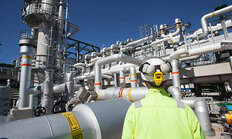- Project Air will receive EUR 97 million from the EU Innovation Fund.
- The facility will be operational by 2026, reducing CO2 emissions by 500,000 tons annually.
- The total investment is EUR 255 million, with additional support from the Swedish Energy Agency.
- The project uses CO2, biogas, and renewable energy to produce sustainable methanol.

Project Overview
Project Air, an industrial collaboration in Stenungsund, Sweden, aims to build a unique facility for sustainable methanol production. The project will receive EUR 97 million from the EU Innovation Fund, marking a significant milestone. Led by Perstorp AB, the facility is expected to be fully operational by 2026, significantly reducing climate emissions from the chemicals industry and its customers.
Funding and Collaboration
The Innovation Fund has confirmed that Project Air will receive the full amount requested in the grant application. Initially launched as a collaboration between Perstorp, Uniper, and Fortum, Uniper will now take over Fortum's part due to ownership changes. The total investment for the project is expected to be EUR 255 million, with additional support of SEK 300 million from the Swedish Energy Agency's Industrial Leap initiative.
Environmental Impact
Project Air captures and utilizes carbon dioxide, which would otherwise be emitted into the atmosphere, to produce sustainable methanol. This methanol serves as a raw material for various chemical products, reducing the climate footprint across multiple value chains. At full capacity, the project will reduce global CO2 emissions by approximately 500,000 tons annually, equivalent to 1 percent of Sweden's entire territorial emissions.
Technological Innovation
The project is based on innovative usage of existing technology in a large-scale industrial application. It utilizes significant amounts of CO2 residue streams from Perstorp’s ongoing operations, as well as biogas and hydrogen from a new electrolysis facility. Existing wastewater processes will also be used in the electrolysis facility, and all electric power for the project will be renewable. Perstorp will handle all process engineering, while Uniper will contribute equipment for the hydrogen electrolysis process.

